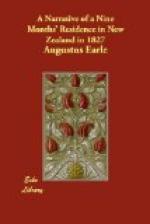The missionary settlement at Kerikeri.
We had travelled all day through a country in which every object we saw was of a character that reminded us forcibly of the savage community we were with. Occasionally we met groups of naked men, trotting along under immense loads, and screaming their barbarous songs of recognition; sometimes we beheld an uncouthly carved figure, daubed over with red ochre, and fixed in the ground, to give notice that one side of the road was tabooed. An extraordinary contrast was now presented to our view, for we came suddenly in front of a complete little English village. Wreaths of white smoke were rising from the chimneys, of neat weather-boarded houses. The glazed windows reflected the brilliant glow from the rays of the setting sun, while herds of fat cattle were winding down the hills, lowing as they leisurely bent their steps toward the farm-yard. It is impossible for me to describe what I felt on contemplating a scene so similar to those I had left behind me.
According to the custom of this country, we fired our muskets, to warn the inhabitants of the settlement of our approach. We arranged our dresses in the best order we could, and proceeded towards the village. As the report of our guns had been heard, groups of nondescripts came running out to meet us. I could scarcely tell to what order of beings they belonged; but on their near approach, I found them to be the New Zealand youths, who were settled with the missionaries. They were habited in the most uncouth dresses imaginable. These pious men, certainly, have no taste for the picturesque; they had obscured the finest human forms under a seaman’s huge clothing. Boys not more than fifteen wore jackets reaching to their knees, and buttoned up to the throat with great black horn buttons, a coarse checked shirt, the collar of which spread half-way over their face, their luxuriant, beautiful hair was cut close off, and each head was crammed into a close Scotch bonnet!
These half-converted, or, rather, half-covered, youths, after rubbing noses, and chattering with our guides, conducted us to the dwellings of their masters. As I had a letter of introduction from one of their own body, I felt not the slightest doubt of a kind reception; so we proceeded with confidence. We were ushered into a house, all cleanliness and comfort, all order, silence, and unsociability. After presenting my letter to a grave-looking personage, it had to undergo a private inspection in an adjoining room, and the result was an invitation “to stay and take a cup of tea!” All that an abundant farm and excellent grocer in England could supply were soon before us. Each person of the mission, as he appeared during our repast, was called aside, and I could hear my own letter read and discussed by them. I could not help thinking (within myself) whether this was a way to receive a countryman at the Antipodes! No smile beamed upon their countenance; there were no inquiries after news; in short, there was no touch of human sympathy, such as we “of the world” feel at receiving an Englishman under our roof in such a savage country as this!




